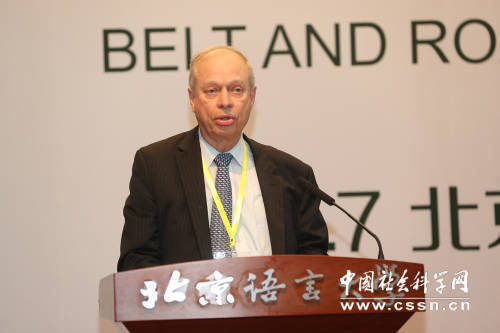 Walter Shearer 【作者简介】 Walter Shearer was born in 1944 in Astoria, Oregon, USA and received his Doctorat d’Etat ès-Sciences in Atomic Physics from the Université de Paris in 1973. Living in the University International City in Paris exposed him to the languages of his 12,000 fellow students from more than 130 countries. This inspired him to read about and study languages and linguistics on weekends and resulted in the draft of a book that attempted to classify all the languages described at that time. After post-doctoral studies in Japan at Tokyo University, he joined the faculty of Tsukuba University there. However, in 1978 he was invited to join the United Nations, where he worked until mandatory retirement in 2006. By that time he had risen to Deputy Chief of the Energy and Transport Branch in the Department of Economic and Social Affairs which was led by Under Secretary-General Ji Chaozhu. During his UN service he was engaged in research, development and reconstruction projects and humanitarian and peace-keeping missions in dozens of countries throughout the world. In the course of these activities, he used his limited linguistic knowledge to organize communication links with officials and the local population. It was in these situations, especially on the peace-keeping and humanitarian missions, when failure to communicate can have dire consequences, that he learned the critical importance of identifying language and dialect boundaries and the crucial role that mutual intelligibility can play in such determinations. One of his responsibilities was the rehabilitation of the electric power sector in northern Iraq after the Iran-Iraq War, which exposed him to the complexities of the language situation in the Kurdish homeland there. On a UN assignment in 1979, he met Professor Fei Xiaotong, then President of the Chinese Academy of Social Sciences, who inspired him to take an interest in the minority languages of China. Over many years, the numerous visits to China that focused primarily on renewable energy activities, notably in Xinbu Village of Shunde County in Guangdong Province, provided an opportunity to collect material on these languages and to meet with Chinese scholars. Through the good offices of Professor Fei, he was introduced to Professor Sun Hongkai, with whom he wrote a book on the Speakers of the Non-Han Languages and Dialects of China (2002, Edwin Mellen Press). After retirement, he joined forces again with Professor Sun on the recently completed Encyclopedia of the 140 Languages of China in 3 volumes, which is to appear in September 2017. Approaching 1,600 pages, this work, which includes the Han language, provides for each language details on the names, speaker population and nationality, classification, dialect situation, phonological information for most dialects, highlights of the lexicology, grammar and morphology, scripts, language vitality and distribution. Particularly valuable is the 135-page bibliography, which demonstrates the monumental work that has been done by Chinese linguists in describing these languages and their dialects. (责任编辑:admin) |
